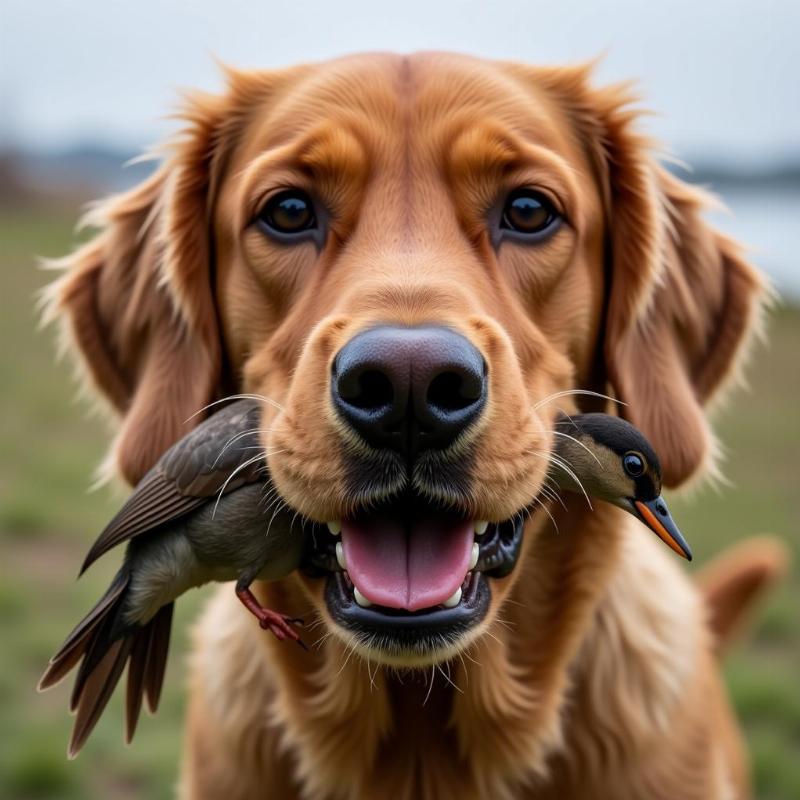My dog killed a bird. This is a surprisingly common occurrence, especially for dogs with a strong prey drive. While it’s natural dog behavior, it can be upsetting for owners. This article will explore why dogs kill birds, potential health risks, how to prevent it, and how to handle the situation when it happens.
Understanding Why Your Dog Killed a Bird
Dogs, particularly certain breeds, have a natural instinct to chase and sometimes kill small animals. This stems from their ancestral wolf lineage, where hunting was essential for survival. Even domesticated dogs retain this instinct, triggered by movement, sound, and scent. Terriers, for instance, were originally bred for vermin control, while retrievers were bred to retrieve hunted birds.
Breed-Specific Instincts
Some breeds are more prone to chasing and killing birds than others. Hunting dogs, like pointers and setters, are specifically bred for this purpose. Other breeds with high prey drives include greyhounds, whippets, and even some herding breeds. Even if your dog isn’t a traditionally hunting breed, individual dogs within any breed can have a stronger prey drive than others.
The Thrill of the Chase
For many dogs, it’s not about the kill; it’s about the chase. The rapid movement of a bird triggers an instinctive response. This excitement can be difficult to control, especially in younger, more energetic dogs.  Dog holding a bird in its mouth
Dog holding a bird in its mouth
Health Risks Associated with Birds
While a natural behavior, killing birds can pose health risks to your canine companion. Birds can carry parasites like worms and mites, which can be transmitted to your dog. More seriously, some birds carry diseases like avian influenza or salmonellosis, which can be dangerous for dogs. my dog killed a bird should i be worried
Parasites and Diseases
If your dog killed a bird, it’s essential to monitor them for any signs of illness, such as vomiting, diarrhea, lethargy, or loss of appetite. Consult your veterinarian immediately if you observe any unusual symptoms. Regular preventative parasite treatments are also crucial for protecting your dog’s health.
Preventing Your Dog from Killing Birds
While completely suppressing a dog’s prey drive can be challenging, there are ways to manage and reduce bird-killing behavior. dog toys for hunting dogs
Training and Recall
Solid recall training is vital. Teaching your dog to respond reliably to commands like “come” or “leave it” can be life-saving, especially in situations where they are focused on a bird. Positive reinforcement methods, such as rewarding your dog with treats and praise, are highly effective.
Environmental Management
Creating a bird-free environment in your yard can also help. Consider using bird netting over fruit trees or gardens and removing bird feeders. Keeping your dog on a leash during walks in areas with high bird populations is another important precaution.
What to Do if Your Dog Kills a Bird
If your dog does kill a bird, remove the carcass immediately, wearing gloves to avoid potential health risks. Wash your hands thoroughly afterward. Observe your dog for any signs of illness and contact your veterinarian if you have any concerns. can a german shepherd be a hunting dog
Conclusion
While the sight of your dog killing a bird can be distressing, remember it’s often an instinctive behavior. By understanding the reasons behind this behavior and implementing preventative measures, you can minimize the risk and protect both your dog and the local bird population. Consistent training, environmental management, and prompt veterinary care when needed are essential for responsible dog ownership.
FAQ
-
Is it normal for my dog to kill birds? While it’s natural for dogs to have a prey drive, excessive bird killing can be managed through training.
-
What diseases can my dog get from killing a bird? Birds can carry parasites and diseases like avian influenza and salmonellosis.
-
How can I stop my dog from killing birds? Consistent training, strong recall, and environmental management are key.
-
Should I be concerned if my dog ate a bird? Monitor your dog for signs of illness and contact your vet if you have concerns.
-
What should I do with the dead bird? Remove it immediately using gloves and wash your hands thoroughly.
-
Are certain dog breeds more prone to killing birds? Yes, hunting breeds and those with high prey drives are more likely to chase birds.
-
Can my dog be trained to leave birds alone? Yes, with consistent training and positive reinforcement, you can teach your dog to “leave it.”
Beautdogs.us is your premier destination for comprehensive dog care information, breed-specific advice, and product recommendations. We cater to both new and experienced dog owners, offering expert guidance on all aspects of dog ownership. Contact us at [email protected] or +1 501-555-7529. Beautdogs.us is dedicated to helping you navigate the joys and challenges of dog companionship.